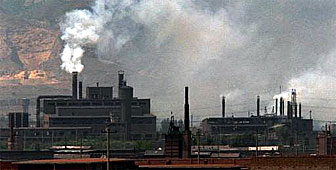
Swiss Re hosts conference on greenhouse gas reduction

Business leaders bear a huge responsibility in the fight against global warming, the chairman of the insurance group, Swiss Re, told a gathering of the world's top environmental experts at a conference near Zurich.
“We must keep in mind that the entire world is watching,” said Peter Forstmoser. “They are watching how business reacts to the call to address reductions in its emissions of greenhouse gases.”
Swiss Re hosted the two-day conference at the company’s Centre for Global Dialogue in Rüschlikon. Among the speakers was Maurice Strong, a senior adviser to the UN secretary-general, and nobel peace prize winner, Kofi Annan.
It is now almost universally accepted that greenhouse gas emissions are a main cause of global warming. At a conference in Bonn last July, 178 countries agreed to enact the Kyoto protocol to cut emissions.
One notable exception was the United States, which, under President Bush, has withdrawn from the protocol.
Those taking part in Swiss Re’s conference this week spoke of the US decision more in disappointment than anger.
“The future belongs to those who know how to manage the present,” said Maurice Strong, “Those entities who are not investing in the environment and sustainability will not be able to catch up later.”
But the US, responsible for a quarter of the world’s greenhouse gas emissions, remains unconvinced that the Kyoto protocol is the instrument that can reduce emissions.
Strong worries what kind of signal the US action will send to the developing world where he believes the battle for sustainability will be won or lost.
“More than 75 per cent of the world’s people live in the developing world and soon more than 50 per cent of the world’s economic growth will be there too.”
Monitoring growth
Strong says that the richer countries can’t simply tell poorer nations to stop growing but says if the developed world does nothing the impact on the world environment could be disastrous.
“We need to make sure that they have access to the technologies and finance that allows them to make reductions. And that’s the best investment we could make in our own future.”
For the US to come back on board Kyoto would involve a complete about face by the Bush administration, which until the September 11 attacks, had shown little inclination for cross-border cooperation.
Most of those at the Centre For Global Dialogue saw little prospect of the US changing its mind. But they hoped that the US would take unilateral measures that might complement Kyoto.
“I think it’s not likely that the US will rejoin the process,” says Strong, “But what is more promising is that the US will see that it is in its own interests” to join in the international effort to control emissions.
Weighing the options
The business community is already considering the ramifications of moving to a low-carbon economy and also weighing up the opportunities for new business.
Swiss Re has estimated that trade volumes in emission reduction projects could grow to up to $145 billion a year and says it is positioning itself to become the leading financial services provider in the sector.
A company like Swiss Re, which has a higher risk appetite than many lenders, sees itself as a catalyst for change.
“At the moment we’re working on a project in Britain that concerns wind farms,” says Chris Walker, who heads the company’s greenhouse gas risk solutions unit.
“The problem they have is that the banks will not loan money for certain risks and without those risks being taken out of the equation, they will not lend.”
There may be some cynicism among environmental groups suspicious of business but Walker says some of the world’s biggest companies have made progress.
“There are some clear leaders,” says Walker, “BP has made some real commitments as has Shell. I think industry is aware but I also think they need clarification on the rules. If they had a clearer delineation, then they would be more likely to comply.”
The deputy head of the European Commission’s Climate Change Unit, Marianne Wenning, issued a strong reminder of the consequences if business failed to live up to its commitments.
Extreme weather events such as storms, floods and droughts would occur more often, she said, posing extreme health risks.
By Michael Hollingdale

In compliance with the JTI standards
More: SWI swissinfo.ch certified by the Journalism Trust Initiative




























You can find an overview of ongoing debates with our journalists here . Please join us!
If you want to start a conversation about a topic raised in this article or want to report factual errors, email us at english@swissinfo.ch.